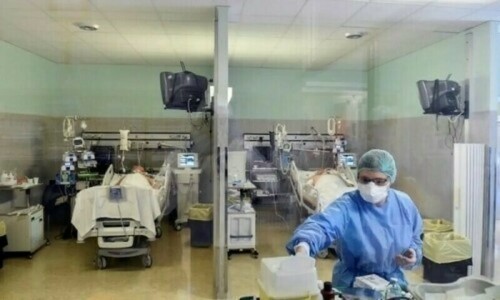ISLAMABAD, Jan 6: Extra-constitutional steps may lead the country to bloodshed and violent revolution because the judiciary would never validate such move of any adventurer.
Chief Justice of Pakistan (CJP) Iftikhar Muhammad Chaudhry expressed these views while speaking at the inauguration ceremony of lawyers' club and chambers in Rawalpinidi on Friday.
He said on July 31, 2009 when the Supreme Court declared the dictator's steps as unconstitutional, the judges of the apex court unanimously decided that at first they should bound the judiciary not to support the dictator at any cost.
He said the rumour-mongers who were propounding unconstitutional change in the country were doing it just to have cheap popularity. He said that the judiciary had drawn the line against such change.
He said that the dictator imposed Martial Law in 2007 in order to extend his rule but the valiant judiciary instead of supporting him gave a historic decision against him.
He appreciated the struggle of the lawyers' community for the restoration of the judiciary and said after its restoration in March 2009, the judiciary had been facing severe problem of backlog of cases at every level from lower to the superior courts. Number of cases pending in the district judiciary was much higher than in the high courts and the Supreme Court. In this situation, the bars raised the voice of the people's conscious and work as sentinels of their freedom.
CJP said after implementation of National Judicial Policy (NJP), a considerable success was achieved especially in the district courts regarding swift disposal of the cases. By and large, the targets set in the policy were achieved with proper assistance and cooperation of the bar. The policy suggested strict adherence to the Code of Conduct by all the judicial officers and court officials and initiation of disciplinary action against the corrupt ones. The Cell for Eradication of Corruption from Judiciary has been established under the supervision of chief justices of the high courts for disciplinary action against corrupt and incompetent judicial officers and court officials. In Punjab, 71 court officials and two judicial officers were shown the door. In Sindh, 29 court officials and two judicial officers were sent on forced retired while in Khyber-Pakhtunkhwa (KP), eight judicial officers and six court officials were compulsorily retired.
He expressed surprise how in Central Jail, Rawalpindi, 4,939 prisoners were huddled against its capacity of 1,994 and directed the authorities concerned to improve the prisoners' condition.
Chief Justice Lahore High Court (LHC) Sheikh Azmat Saeed in his brief speech assured the lawyers that the judiciary would not take any decision that might bring disgrace to its name.
He said that the people had attached a lot of expectations with the judiciary and the courts would never dash their hopes and protect their rights.
Malik Jawad Khalid, President Rawalpindi Bar Association after paying gratitude to the judges appealed for the release of an advocate, Amr-i-Rabbi who had been in alleged confinement of the spy agencies since nine months. He said that the bar, on a number of occasions, passed resolutions for his release but the whereabouts of the lawyer was still not known. He requested the judges to look into the matter.













































Dear visitor, the comments section is undergoing an overhaul and will return soon.